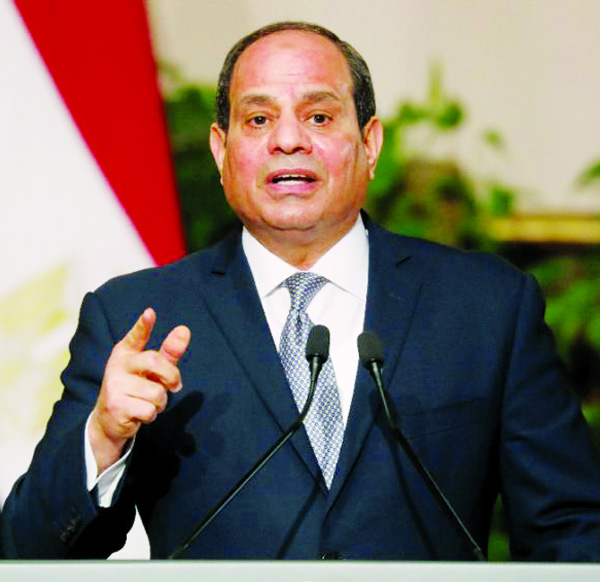
AFP, Cairo :
As mass protests rock other Arab countries, a snap referendum in Egypt has gone against the grain and cemented President Abdel Fattah al-Sisi’s rule for years to come.
The three-day ballot saw constitutional changes sail through that allow the former military chief to stay in power until 2030, boost his control over the judiciary and give the army even greater influence in political life.
Amid criticism that Sisi has silenced opposition and cracked down on freedoms, officials said more than 88 percent of ballots cast were for “yes”. The government has “made sure Egyptians don’t see any credible alternative to Sisi so that they don’t start to imagine an Egypt that is ruled by anyone else,” said Timothy Kaldas, a non-resident fellow at the Tahrir Institute for Middle East Policy. The vote in the Arab world’s most populous country came on the heels of uprisings that have forced veteran leaders in Algeria and Sudan to step down earlier this month. And Kaldas said after years of turmoil that saw the ouster of long-time ruler Hosni Mubarak and his Islamist successor Mohamed Morsi, stability remains a priority for many Egyptians.
“Undoubtedly some still support Sisi and believe that he has prevented Egypt from suffering the fate of neighbours,” he said. “For most Egyptians, they believe they’ve overthrown two presidents and seen their quality of life get worse each time, so there’s little faith that a third uprising will improve the situation.”
Around 27 million votes were cast, with a turnout rate of 44.33 percent, at the referendum after it was called and held within a matter of days. The amendments prolong Sisi’s current term to 2024 from 2022 and allow him to then run for another six-year term. “The country is on the right track and it’s stable… it’s logical that Sisi is given his full chance to finish what he started,” said Mervat Abdel Fattah, a housewife in her fifties.
As mass protests rock other Arab countries, a snap referendum in Egypt has gone against the grain and cemented President Abdel Fattah al-Sisi’s rule for years to come.
The three-day ballot saw constitutional changes sail through that allow the former military chief to stay in power until 2030, boost his control over the judiciary and give the army even greater influence in political life.
Amid criticism that Sisi has silenced opposition and cracked down on freedoms, officials said more than 88 percent of ballots cast were for “yes”. The government has “made sure Egyptians don’t see any credible alternative to Sisi so that they don’t start to imagine an Egypt that is ruled by anyone else,” said Timothy Kaldas, a non-resident fellow at the Tahrir Institute for Middle East Policy. The vote in the Arab world’s most populous country came on the heels of uprisings that have forced veteran leaders in Algeria and Sudan to step down earlier this month. And Kaldas said after years of turmoil that saw the ouster of long-time ruler Hosni Mubarak and his Islamist successor Mohamed Morsi, stability remains a priority for many Egyptians.
“Undoubtedly some still support Sisi and believe that he has prevented Egypt from suffering the fate of neighbours,” he said. “For most Egyptians, they believe they’ve overthrown two presidents and seen their quality of life get worse each time, so there’s little faith that a third uprising will improve the situation.”
Around 27 million votes were cast, with a turnout rate of 44.33 percent, at the referendum after it was called and held within a matter of days. The amendments prolong Sisi’s current term to 2024 from 2022 and allow him to then run for another six-year term. “The country is on the right track and it’s stable… it’s logical that Sisi is given his full chance to finish what he started,” said Mervat Abdel Fattah, a housewife in her fifties.

